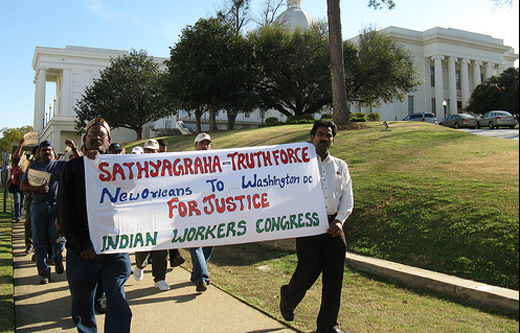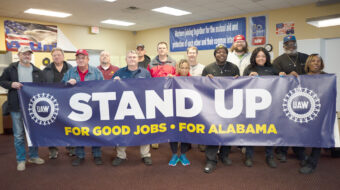
The Bush administration used two federal agencies to instruct a major corporation on how to harass, fire and deport hundreds of Indian “guest workers” working on post-Hurricane-Katrina reconstruction, newly released documents show.
The papers, released at a Washington press conference Feb. 3 by lawyers for the workers, show that the Immigration and Customs Enforcement and the Border Patrol directed the Signal Corporation in March 2007 on how to repress 500 Indian workers who were organizing to protest their working conditions.
The workers were brought from India on H-2B visas to work in the company’s Mississippi and Texas facilities, presumably because they would provide the cheaper but skilled labor needed to rebuild after the hurricane. The company claimed, at the time, that it needed to bring 500 skilled welders and pipefitters from India because it could not find that many skilled U.S. workers.
Eddie Acosta, an AFL-CIO spokesperson, noted that, contrary to Signal’s claim, there were hundreds of such skilled American workers available throughout the Gulf region, many of whom were out of work and available in the aftermath of Katrina.
The sworn court depositions, taken by lawyers for the workers, show that representatives of the Bush-controlled agencies mapped out for Signal executives a schedule of arbitrary firings and rapid private deportations of individuals who were seen as organizers of the protest against inhumane conditions at the shipyards.
Among the conditions workers protested were imprisonment in cramped company housing surrounded by barbed wire, inhumane workloads, and forced labor for many hours without pay.
One of the documents released shows that several Signal officials actually resisted when ICE told them to fire workers who then, under the H-2B visa program, could be immediately deported.
The resistance was not due to company concern for human rights, however, but to the suggestion by ICE that the company could speed up the deportation if it paid for the plane tickets back to India.
It has been known for over a year that Signal had employed human traffickers in India who “recruited” the workers with promises of permanent visas and residency, all of which were broken. For this and other violations the Equal Employment Opportunity Commission, another federal agency, has already assessed $22 million in fines against the company.
But the revelation of the Bush administration role in the scandal is new.
The New Orleans Workers’ Center for Racial Justice, which has filed a federal class action suit against Signal on human trafficking charges, organized the taking of the sworn depositions that reveal the collaboration between Signal and the Bush administration.
In May 2008, the workers staged a 29-day hunger strike at the White House. They were given a congressional hearing and House and Senate committees are now looking into overhauling the H-2B visa system.
The AFL-CIO has been pressing lawmakers to dump the H-2B visa altogether and has been providing legal assistance to the Indian workers.
“This isn’t an isolated incident, Signal isn’t an isolated company and ICE isn’t an isolated agency,” Acosta said. “The agency tramples workers’ rights all the time and the H-2B system of temporary visas is so rife with problems that we oppose its continuation.”
Many companies, however, anxious for cheap labor, support expanding the program even further.
Aby Raju, one of the Indian workers who had been employed by Signal, said that once he and his co-workers arrived from India, “we were held in a labor camp in the shipyard, penned in behind barbed wire and guarded by security so no one knew our whereabouts. We were 24 men to a small room with no privacy and two toilets. They charged so much for the food and bunks that we couldn’t send any money home or repay our families for the money they spent helping us get to the United States.”
He explained that he was one of a few who managed to escape the “horrible conditions” at the camps in Pascagoula, Miss., and Orange, Texas. Those who escaped sought legal help in New Orleans and later staged the sit-in in Washington.
Raju claimed that even when the abuses were actually occurring workers knew that the Bush administration was actively supporting company efforts to thwart any union organizing efforts. “We asked our manager about the conditions and the retaliation and he said, ‘This is according to the U.S. government. This is what we do’.”
One of the papers released at the press conference documents a phone call to ICE from a Signal official asking for “advice on how to deport workers who are causing unrest.”
Another quotes an internal company e-mail that summarized one meeting between Customs and Signal officials: “Customs is willing to support Signal International however it can to send the message that Customs has no intention of allowing these employees free reign.”
Another Signal official testified in his deposition: “The impression I was left with after the talks with the federal agencies was to immediately deport the worker activists.” The Signal official said he was told, “Don’t give them any advance notice, take them all out of the line on the way to work, get their personal belongings, get them in a van, get their tickets, get them to the airport and send them back to India, even if their H-2 B visas haven’t expired.”
Lawyers for the New Orleans Workers’ Center for Racial Justice say the group is not satisfied with FBI investigations of conditions at Signal that began in 2008. They say that those were compromised by ICE. The group is calling for a wide-ranging investigation by Congress.
Photo: New Orleans Workers Center for Racial Justice (www.nowcrj.org/gallery/)












Comments